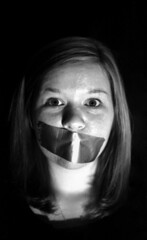Naughty Words in YA Literature
 "You'll never be invited to dinner at The White House" is a phrase my father has repeated to me for various things I've said and done that he doesn't think would be acceptable in high class social settings. Burping at the table is popular with me. I'm also fond of swearing, and my dad is an inspiration in that department.
"You'll never be invited to dinner at The White House" is a phrase my father has repeated to me for various things I've said and done that he doesn't think would be acceptable in high class social settings. Burping at the table is popular with me. I'm also fond of swearing, and my dad is an inspiration in that department.
My mom tells me that when I was in Kindergarten, my teacher cornered her one day and had the, "Do you know what your daughter said today?" talk. She knew exactly where all the colorful language came from.
I've toned it down a little bit. At least now I limit most of my swearing to the home. I also try to keep it out of my social media updates. However, I didn't show this restraint when I was a teenager. As the token agnostic in my pack of high school friends, I was under a lot of pressure: I had to make-up for all the swearing my friends couldn't do without going to confession (the Catholics) or doing whatever Mormons do to cope with naughty behavior. It was hard work, but I did it, and I think I did it well. Needless to say, my use of four-letter words peaked in my late teens.
Given that, I'm surprised at the number of writers who still get concerned about the use of "the F bomb" in YA manuscripts. Yes, certain publishing houses still appear to labor under the delusion that teenagers think the stork delivers babies and that people never use dirty words, but that doesn't apply to the majority. I understand that profanity can be a very personal experience and preferences can vary. I'm a fan of the F bomb, the "SH" word, and, occasionally the word for a female dog (only if it's well-deserved though.) I can't stand the "C" word and I'm not a fan of the other popular terms for "down there."
Still, I have to wonder about people who seem so concerned about profanity in books for teens. Have they listened to teenagers talk recently?
Oh well. I'm not going to let it bother me, even if it costs me an invite to The White House. I'm happy to let fly in my drafts and leave the censorship to editors.